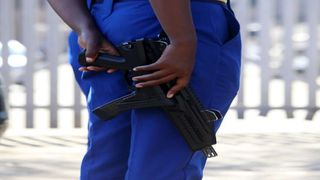
A police officer in Nairobi last year.
| File I Nation Media GroupNews
Premium
Police now change tack in extrajudicial killings
When Covid-19 was reported in the country, President Uhuru Kenyatta invoked the Public Order Act that put in place the curfew, with hopes of keeping infections down and protecting Kenyans from dying of the disease.
The beginning of the curfew, however, intensified police brutality in the country, leading to the deaths of tens of Kenyans as a result.
Of concern to human rights defenders is the fact that rogue police officers are now killing Kenyans using ways that do not easily expose the identity of the officer that perpetrated the killing. Kenyans are no longer being killed with guns and bullets. They are hit with batons, suffocated, drowned and even butchered.
In the past, it was easy to track a police officer using excessive force against the National Police Service Act and the Service Standing Orders through ballistic examinations on the guns used by the perpetrator; an example being last year’s shooting of Yassin Hussein Moyo, 13.
Embu brothers
Just last week, brothers Benson Njiru Ndwiga, 22, and Emmanuel Marura Ndwiga, 19 were buried at their home in Embu. The two were arrested by police officers on August 1, at Kianjokoma in Embu County, and relatives found their bodies in a mortuary three days later.
They had been arrested for being outdoors after the 10pm curfew. An autopsy found that the brothers had died of head and rib injuries. Police officers said the two men had jumped from a moving police vehicle, but the family and the public have doubted that the injuries are consistent with the police account.
Kitengela four
Three months ago, four men who were abducted in Kitengela were found dead, and their bodies dumped in a river in Murang’a. The four had allegedly been arrested by police officers.
Residents of Murang’a are also still seeking answers after the handcuffed bodies of Nicholas Maithya and Asman John Kamau were retrieved from a swollen river at Gatiiguru, after they were arrested at a chang'aa distillery.
A police report at Ithanga Police Station on May 9 stated that the two jumped into the river to evade arrest by 10 police officers.
Kayole murder
On Thursday, Kayole erupted in chaos as residents protested the death of John Kiiru,38, who was beaten to death for violating the 10pm-4am curfew.
Mr Kiiru was a pillion passenger on a boda and was heading home. Police officers arrested him at Tushauriane stage and allegedly beat him to death.
He died just minutes after calling his wife, Esther Wanjiru, to tell her that police officers had seriously assaulted him.
And while Kayole residents were demonstrating in Nairobi, a family in Nakuru marched to the Independent Policing Oversight Authority (Ipoa) offices to demand that an investigation is done concerning the death of their family member.
Simon Muthee, a boda and a tout on the Solai-Nakuru passenger service vehicles, was found dead and his body retrieved from a dam one week after he was arrested. His motorcycle was found at the Solai Police Station where he had been taken after the arrest.
The family believes the police killed him. His burial was postponed for the second time on Wednesday after Rongai officer commanding police division and Directorate of Criminal Investigations Officer met the locals but failed to give the awaited investigation report. This led to a clash between locals and the administration.
His father, Mr Peter Kariuki, says the family has been forced to postpone his son’s burial as they await a full investigation report, which will hopefully shed light on what transpired.
“Our efforts to seek answers to know what really happened before he died have been futile. We are just being taken round by our security officers. All I want is justice for me to bury my son. We won’t keep on postponing his burial, he needs to rest,” said Mr Kariuki.
“The police can’t even answer simple questions of how my son's motorbike, shoes and belt were found in their custody while his lifeless body was found in a dam. How is that even possible? I don’t want such to happen to another child,” added Mr Kariuki.
Despite Human Rights Groups and defenders pushing for a change in the way police officers treat civilians, in a bid to end extrajudicial executions, the situation continues to escalate.
The Police Reforms Working Group (PRWG), recently stated that at least 25 cases of extrajudicial executions and a further 43 cases of torture linked to the enforcement of the Covid-19 containment measures had been reported since the beginning of the year.
“We note that suspicious deaths in police custody are one of the circumstances in which the coroner’s office under the coroner-general would have been called upon to carry an autopsy, preservation and analysis of other evidence to ascertain the cause of death, including whether they were tortured,
“Sadly, the National Coroners Service Act 2017 has not been operationalised since its passage in 2017,” PRWG said in a statement.
Despite President Uhuru Kenyatta apologising on behalf of the National Police Service for the brutality meted out on Kenyans during the enforcement of Covid 19 regulations, even giving a firm directive for investigations into some of the deaths believed to have happened in police custody, nothing seems to change.
Other institutions continue to call for an end to police brutality during the pandemic.
“It is shocking that people are losing their lives and livelihoods while supposedly being protected from infection,” says Human Rights Watch HRW’s senior Africa researcher Otsieno Namwaya.
President of the Law Society of Kenya Nelson Havi called on the resignation or sacking of Interior Cabinet Secretary Fred Matiang’i and National Police Service boss Hillary Mutyambai if the killers are not charged.
Additional reporting by Mercy Koskei





